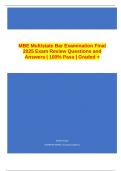MBE Multistate Bar Examination Final
2025 Exam Review Questions and
Answers | 100% Pass | Graded +
David Mungai
[COMPANY NAME] [Company address]
, MBE Multistate Bar Examination Final
2025 Exam Review Questions and
Answers | 100% Pass | Graded +
Torts: How Intervening Forces Affect the Element of Legal or
Proximate Cause. AKA Indirect Causation - Answer>> As a
general principle in negligence actions, a defendant will be liable
only if his breach of care is shown to be the legal (proximate)
cause of plaintiff's harm. Not all harm actually caused by the
defendant will result in liability. In this case, the chain of events
started when the fan discarded the plastic bag. The police officer
then acted negligently in failing to remove the bag from the
horse's bridle. The intervening force that came into motion after
the officer's negligence was the horse's reaction of running into
the crowd and striking the man. This situation presents an
example of indirect causation (the officer's negligence caused his
horse to be scared, and the horse then ran away and caused the
man's death). Unmistakably, serious personal injury or even
death is foreseeable when a large, powerful animal becomes
frightened and runs through a crowded stadium. Given the
foreseeability of the ensuing events, it is likely that the defendant
will be held liable for the man's death
Torts: Fire Fighter Rule - Answer>> The firefighter's rule is
triggered only where a firefighter (or police officer) is bringing suit
as a plaintiff, and does not apply in this case involving a claim
against a police department.
Breach of Covenant Warranty Deed/Adverse Possession -
Answer>> A general warranty deed normally contains the
following five covenants for title: 1) covenant of seisin; 2)
covenant of right to convey; 3) covenant against encumbrances;
4) covenant for quiet enjoyment; and 5) covenant of warranty. In
this question, it is necessary to distinguish between a covenant
,against encumbrances and a covenant of warranty. On the one
hand, the covenant against encumbrances is a covenant assuring
that there are no encumbrances (such as easements, liens,
mortgages) against the title. On the other hand, the covenant of
warranty is a covenant wherein the grantor agrees to defend the
grantee against claims of title by a third party, and to compensate
the grantee for any loss sustained by the claim of superior title.
Since the investor is defending title against the man's adverse
possession caveat emptor would not apply duty to inspect is not
applicable, the adverse possessor occupied the premises when
the warranty deed was conveyed.
Contracts: Condition Precedent - Answer>> A condition
precedent is an event that must occur before a party is under a
duty to perform. The employee is not challenging the contract,
rather the reasonableness sign posted on the wall of the $50 fine
for being late to work
Contracts: Liquidated Damages - Answer>> The validity of a
liquidated damages provision is evaluated by the courts as
follows: it must appear at the time of formation that (1) damages
will be difficult to ascertain, and (2) the parties who agree on a
provision for liquidated damages must make a reasonable
estimate of the losses to be expected from breach. In this case,
the first prong may be satisfied, but the man can argue that $50 is
not a reasonable estimate because it takes no account of how
late he is. He may succeed on this argument, and he has a lesser
chance of success with the others.
Contracts Hypo: Modification or Waiver of Condition? The Pre-
existing Duty Rule/Hypo - Answer>> E.g. Homeowner and
Contractor have a contract to build a shed and pave the driveway
for $30,000; homeowner changes mind and says I'm going to
plant a garden there so don't pave the driveway just build the
shed; homeowner changes mind again and say no pave the
, driveway and build the shed I'm not going to plant a garden;
contractor refuses, who will prevail? The Homeowner.
Contracts Hypo: Modification or Waiver of Condition? The Pre-
existing Duty Rule/Rule/Explanation - Answer>> This contracts
question addresses the distinction between modification and
waiver of a condition. Many students will be tempted to choose
choice (B), assuming there was a valid waiver of a condition that
cannot be reclaimed in the contract to pave a driveway. By
definition, a condition is any fact or event other than lapse of time
that qualifies a promisor's present duty of performance. However,
the builder's obligation to pave the driveway was not a condition,
but an express promise. As a result, it is necessary to determine
whether the modification was valid releasing the builder of his
duty to pave the driveway. Under the pre-existing duty rule, an
enforceable agreement to modify a contract requires
consideration on both sides. Because the modification was not
supported by consideration, it would be unenforceable.
Constitutional Law/Equal Protection Cases/Discriminatory
Laws/Burden of Proof - Answer>> The initial burden is on the
plaintiff to show a discriminatory purpose, and, if proven, the
burden shifts to the state to show the measure furthers a
compelling state interest.: In order to subject a law to any form of
review under the equal protection guarantee, one must be able to
demonstrate that the law classifies people in some manner. A
classification within a law can be established in one of two ways.
First, the law may establish the classification "on its face." This
means that the law by its own terms classifies people for different
treatment. In such a case there is no problem of proof and the
court can proceed to test the validity of the classification by the
appropriate standard. Second, the law may be tested in its
"application." In these cases, the law appears to be "neutral on its
face," but will be applied in a different manner to different classes
of people. In the latter situation, the plaintiff bears the initial




